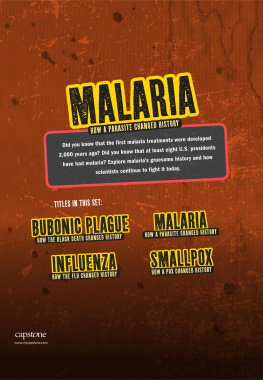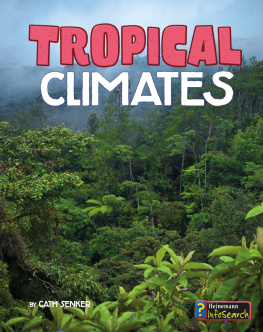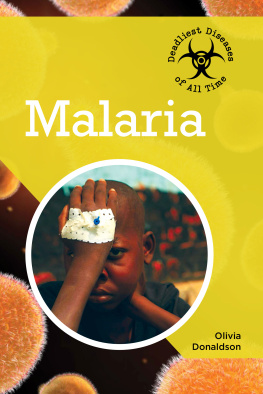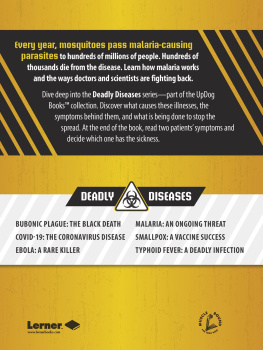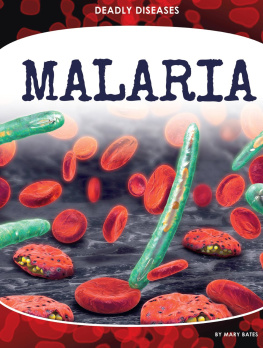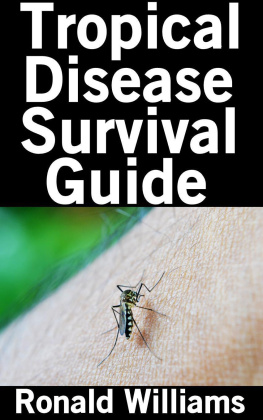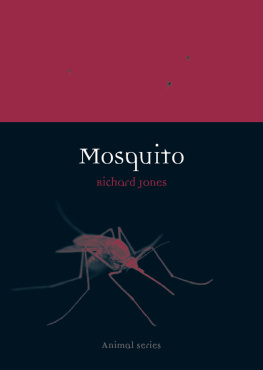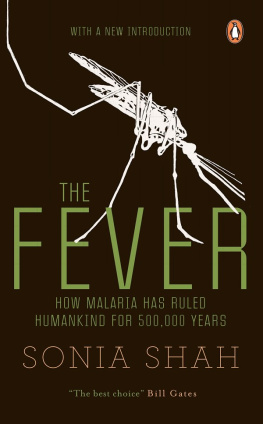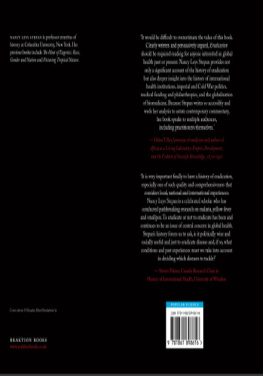THE MAKING OF A TROPICAL DISEASE
JOHNS HOPKINS BIOGRAPHIES OF DISEASE
Charles E. Rosenberg, Series Editor
Randall M. Packard, The Making of a Tropical Disease: A Short History of Malaria
Steven J. Peitzman, Dropsy, Dialysis, Transplant: A Short History of Failing Kidneys
THE MAKING of a TROPICAL DISEASE

A Short History of Malaria
Randall M. Packard

2007 The Johns Hopkins University Press
All rights reserved. Published 2007
Printed in the United States of America on acid-free paper
Johns Hopkins Paperback edition, 2011
2 4 6 8 9 7 5 3 1
The Johns Hopkins University Press
2715 North Charles Street
Baltimore, Maryland 21218-4363
www.press.jhu.edu
The Library of Congress has catalogued the hardcover edition of this book as follows:
Packard, Randall M., 1945
The making of a tropical disease : a short history of malaria / Randall M. Packard.
p. ; cm. (Johns Hopkins biographies of disease)
Includes bibliographical references and index.
ISBN-13: 978-0-8018-8712-3 (hardcover : alk. paper)
ISBN-10: 0-8018-8712-7 (hardcover : alk. paper)
1. MalariaHistory. I. Title. II. Series.
[DNLM: 1. Malariahistory. WC 750 P119m 2007]
RC160.P33 2007
616.9362009dc22 2007011828
A catalog record for this book is available from the British Library.
ISBN-13: 978-1-4214-0396-0
ISBN-10: 1-4214-0396-X
FOREWORD
Disease is a fundamental aspect of the human condition. Ancient bones tell us that pathological processes are older than humankinds written records, and sickness still confounds our twenty-first centurys technological pride. We have not banished pain, disability, or the fear of death even if we die, on average, at older ages, of chronic and not acute ills, in hospital or hospice beds, and not in our own homes. Disease is something men and women feel. It is something in our bodiesbut also in our minds. Disease demands explanation; we think about it and we think with it. Why have I become ill? And why now? How is my body different in sickness from its quiet functioning in health? Why in times of epidemic has a whole community been scourged?
Answers to such timeless questions necessarily mirror and incorporate available ideas and assumptions. In this sense, disease has always been a social and linguistic as well as biological entity. In the Hippocratic era, physiciansand we have always had them with uswere limited to the evidence of their senses in diagnosing a fever, an abnormal discharge, or seizures. Classical notions of the somatic basis for such alarming symptoms necessarily reflected and expressed contemporary philosophical and physiological notions, a speculative world of disordered humors and breath. Today we can call for understanding upon a variety of scientific insights and an armory of diagnostic and therapeutic practicestools that allow us to diagnose ailments unfelt by patients and imperceptible to the doctors senses. In the past century disease has become increasingly a bureaucratic phenomenon, as well, as sickness has been defined and in a sense constituted by formal disease classifications, treatment protocols, and laboratory thresholds.
Sickness is also linked to climatic and geographic factors. How and where we live and how we distribute our resources all contribute to time- and place-specific incidence of disease. For example, ailments such as typhus fever, plague, malaria, dengue, and yellow fever reflect specific environments that we have shared with our insect contemporaries. But humankinds physical circumstances are determined in part by cultureespecially agricultural practice. Environment, demography, ideas, and applied medical knowledge all interact to create particular ecologies of disease at particular moments in time.
Disease is thus historically as much as biologically specific. Or perhaps I should say that every disease has a unique past. Once discerned and named, every disease claims its own history. At one level biology creates that idiosyncratic identity. Symptoms and epidemiology as well as cultural values and scientific understanding shape responses to illness. Some writers may have romanticized tuberculosis, but as the distinguished medical historian Owsei Temkin noted dryly, no one had ever thought to romanticize dysentery. Tuberculosis was pervasive in nineteenth-century Europe and North America and killed far more people than cholera did, but it never mobilized the same widespread and policy-shifting anxiety. Unlike tuberculosis, cholera killed quickly and dramatically and was never accepted as a condition of life. Sporadic cases of influenza are normally invisible, indistinguishable among a variety of respiratory infections; waves of epidemic flu are all too visible. Syphilis and other sexually transmitted diseases, to cite another example, have had a peculiar and morally inflected attitudinal history. Some diseases such as smallpox or malaria have a long history, others like AIDS a rather short one. Some have flourished under modern conditions; others seem to reflect the realities of an earlier and less-economically-developed world.
These arguments constitute the motivational logic behind the Johns Hopkins Biographies of Disease. Each historically visible entityeach diseasehas a distinct history. Biography implies chronology and narrativea movement in and through time. Once inscribed by name in our collective understanding of medicine, each disease entity becomes a part of that collective understanding and, thus, inevitably shapes the way in which individuals think about their own felt symptoms and prospects for future health.
No disease illustrates the complex interdependencies that shape disease incidence and experience better than malaria; like infant mortality it is an index to a societys material conditions and social arrangements. Malaria is multifactorial, exquisitely sensitive to particular environmental circumstances and social and economic relationships. Nevertheless, since classical antiquity, physicians and observers have associated it with environmental circumstances, with marshes, with dampness, and with low-lying lands. But geography is not malarias one-dimensional destiny; in the past it has flourished in both old England and New England. Poverty and inequality as much as geography and climate make malaria a tropical disease. Randall Packard has demonstrated in this wide-ranging synthesis how much malaria is both actor and acted upon in agricultural history, in the distribution of political and economic power, in imperial relationships, and in the movement of populations. Although a significant factor, it has never been an independent variable, even if historians have associated it in retrospect with the declining fortunes of classical Greece and Rome. Our understanding of the role of the anopheles mosquito as vector or the availability of quinine and its descendants as tools for malarias clinical management has constituted only one factor in the diseases changing fortunes. Accumulating medical knowledge has created choices, not dictated them. The multifaceted history of malaria illuminates fundamental aspects of human history.
Charles E. Rosenberg
PREFACE
Mulanda

I have spent much of the past 20 years researching and writing about the history of malaria, a disease caused by a parasite that is transmitted through the bite of a female
Next page

